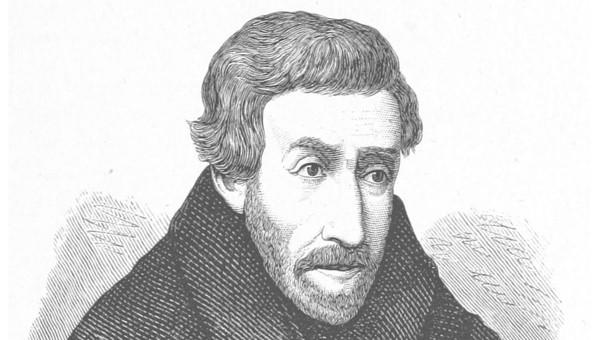The Society of Jesus has recently announced four Universal Apostolic Preferences, which are intended to guide Jesuit works in their mission of reconciliation and justice over the next ten years. The preferences, says Thomas Flowers SJ, ‘are a call to a renewed personal, communal and apostolic discernment of how to serve the Church and the world today’. What can the modern Society learn from the example of a sixteenth century Jesuit who had to listen carefully to the way in which God was calling him to be of service when he felt drawn to many different ministries?
It bothered Peter Canisius (1521-1597) that he couldn’t do everything. He’d already been working for months writing a ‘summary of Christian doctrine’ when he admitted to Ignatius of Loyola in a letter just how burdensome he found the task. The work kept him alone in his room with his books and left him dreaming of the good he wasn’t accomplishing in the hospitals and prisons. As it was, he hardly had sufficient time to work on his book given his primary mission teaching theology at the University of Vienna. We can almost hear the exasperation in his voice as he writes that: ‘I am not content with all this exhaustion, and I fear that I could not finish for many years if I continue thus with the lessons at the same time as this enterprise.’[1]
Three years before he would publish the stunningly popular and effective catechism that would eventually garner him the moniker of the Second Apostle of Germany, Peter Canisius wondered if it was worth the trouble. Canisius, known to history as a catechist, had a pastoral heart that was troubled, at times, by the missions entrusted to him by his Jesuit superiors. As Jesuits and those with whom we work stand before the mission entrusted to us all by Fr General Sosa and Pope Francis to commit ourselves to the four new apostolic preferences, I am convinced that Canisius’s witness can be of help to us in our discernment.
The Universal Apostolic Preferences ought not to come to us as a shock. Not only can we recognise the many ways different Jesuit works already emphasise the importance of the ministries indicated by the preferences, but we know that, for the most part, Jesuits and their partners have engaged in these works since the beginning. We need look no further than the founding documents of the Society, the two versions of the Formula of the Institute as contained in the papal bulls of 1540 and 1550, to see this. The formula assures us that the Society must labour for ‘the progress of souls in life and Christian doctrine’ through, among other things, ‘the Spiritual Exercises [and] the education of children,’ which ought to remind us of the first and fourth apostolic preferences, for the Exercises and for accompanying youth, respectively. The call to ‘assist and serve those who are in prisons or hospitals’ in the formula draws our attention to the second apostolic preference of walking with the poor and the marginalised. And although a specific ecological focus on the care of our common home might be new, if we recall Fr Sosa’s words that ‘damage done to the earth is also damage done to the most vulnerable,’ we can recognise the connection between this third preference and the formula’s insistence that Jesuits be willing to undertake other ‘works of charity’ which are ‘expedient for the glory of God and the common good.’[2]
Yet the mission of the apostolic preferences goes far beyond recognising what Jesuits have done or what we are doing: most fundamentally, the preferences are a call to a renewed personal, communal and apostolic discernment of how to serve the Church and the world today. As we are reminded by Peter Canisius’s concern with his personal neglect of prisoners and the sick in order to engage in catechetical writing, the problem for all of us who have pastoral hearts and passionate spirits lies not in recognising the needs that surround us, but in discerning where our limited energy and resources might be best utilised for God’s greater glory. For Canisius, it was precisely through the slow process of coming to understand what, amid the many ministries in which he engaged, deserved preferential treatment that he discovered the most effective way he could serve God and the Church.
The letter referenced above, in which Canisius complained about his catechetical writing, must have been particularly difficult for him to write. Indeed, the reason he wrote on that particular day was because the day before, his superior had died, and someone needed to inform Ignatius. His deceased superior was Claude Jay, one of the original ten Jesuits and among the first mentors of Canisius’s vocation – his first teacher having been Pierre Favre, whom Canisius had also already lost in his young Jesuit life. And although Canisius endeavoured in the letter to maintain a pious and dispassionate posture, as he writes about Jay all composure slips and his thoughts seem to tumble over themselves as he recounts all the good Jay had done and the many who mourn him. It is, thus, all the more poignant when, as he laments the way his catechetical writing keeps him from pastoral work, he pauses to tell Ignatius that when he shared these concerns with Jay, the older Jesuit had assured him that, ‘I might leave off all the rest and give myself and all my time to composing this Work.’[3] Hearing that from Jay had clearly troubled Canisius, but he gives no indication in the letter that he understood why Jay thought the project so important.
He nonetheless allowed Jay’s words to rattle him – he let the preference Jay showed for the composition of a catechism upset his own preferences for how he would spend his time as a Jesuit. Canisius ended up having plenty of other work to occupy him in his life: as a provincial for fourteen years, as the principal preacher at the cathedral in Augsburg for much of the time he was also provincial, and as the co-founder of or driving force behind over a dozen Jesuit colleges, to name but a few of the things that kept him busy over 54 years of religious life. But when, in the year before he died, he wrote his Spiritual Testament, praising God’s goodness to him and relating the major events of his life, he reserved the final narrative section to speak of his labours with the pen. Here, he declared that he wished to ‘treat of my writings . . . by the grace of God published in Germany and often printed elsewhere’ so that ‘my kind of zeal in the Church of Christ ought to be known more certainly also in this way.’[4] His writing received pride of place in the list of his accomplishments, and he thanked God and his superiors that in the last years of his life he had been asked to devote all of his time to writing, because he believed it was the best way for him to be of service. From seeing his writing as a distraction from pastoral work, Canisius had come to prefer his writing to every other kind of work he might undertake. Somehow Jay’s preference, and the constant encouragement of Ignatius and the other superior generals under whom he served (Diego Lainez, Francisco Borgia and Claude Acquaviva) had changed his mind and made him look at his work differently.
Canisius never lost his concern for the poor – sermon after sermon in Augsburg attest to his relentless efforts to inspire Catholics to care for their suffering brothers and sisters. And while Canisius was provincial and preacher at the cathedral in Augsburg, he never stopped visiting hospitals, teaching catechism to children and giving the Exercises to individuals. So, too, Canisius took questions of justice into consideration as an administrator. It concerned him, for example, that often enough princes who wanted the Jesuits to found colleges offered them buildings and properties that were supposedly abandoned, when in reality the prince was driving out a small group of religious from their once-thriving monastery or failing to consider lay tenants on the monastery land. Canisius’s fight against such practices shows that his educational concerns never extinguished his care for the common good. He knew that in whatever he was doing, if he was not considering the poor, the young, the spiritually hungry and the common good then his entire ministry was impoverished. It was not enough to think only of the people before him – he needed to make every ministry in which he engaged one that kept the integral mission of the Society always at its heart.
This is perhaps why Peter Canisius’s catechism looks so different from nearly every other catechism that has been written in the history of the Christian Church. As many of us know from the 1992 Catechism of the Catholic Church, the standard approach to teaching catechesis in the Catholic Church presents doctrine according to a four-part structure: Faith (following the text of the Apostles’ Creed), Sacraments, Morality (using the Ten Commandments as a guide) and Prayer (using the Our Father as a guide). This was true both before and after Canisius wrote his catechism, and he certainly teaches all of those elements in his catechism. But his does not have a classic four-part structure. Instead, he divides his catechism into two books. The first book is on Wisdom, in which he presents Faith (following the Creed), Hope (following the Our Father), Love (following the Ten Commandments) and the Sacraments. The second book, on Justice, is more of his own creation. There are two chapters: the first one on ‘fleeing evil’, in which he talks about sin and vice; and the second on ‘seeking good’, in which he talks about virtue, good works, the beatitudes and the evangelical counsels, among other things. When we step back and consider the overall structure of his catechism, we can gain some insight on how Canisius maintained his pastoral concerns even as he gave preference to teaching the young. For Canisius’s catechism moves from revealing God’s goodness and wisdom as elucidated through faith, hope and love, and as experienced through the sacraments, to how we can live out our faith in the world, avoiding those things that lead away from God and seeking God’s justice in our lives. Canisius’s catechism invites its readers to begin in faith and then to put that faith into practice in the way that we love and serve.
Canisius came to give preference to his catechetical work because he recognised in it a way that he was uniquely capable of caring not only for the apostolate of imparting the faith to the young, but for instilling in the young a way to live that kept the poor in mind, that was rooted in prayer and discernment, and that never neglected the common good. He only came to realise just how much good he could do through that particular apostolate when he gave up worrying about the good he wasn’t doing enough of, and listened to the way God was speaking to him through the call of the Society and groanings of the Church.
After a particularly dispiriting time in which Canisius had been a minor participant in some high-level political and religious wrangling in Poland, he ended a letter to Diego Lainez, then superior general, by declaring that, ‘however much more afflicted and even hopeless things are in the judgment of the world, how much more will it be ours to carry strength to the hopeless because we are of the company of Jesus.’[5] The apostolic preferences invite us to just such resolute hopefulness in the way that they challenge us to consider how we might imagine our work anew. Canisius’s experience of coming to see his catechism as the most significant apostolic preference of his life and the way he could most broadly serve the preferences of the whole Society can remind us of the significance of listening beyond ourselves to discover ‘the best contribution we can make with what we are and have.’[6]
Thomas Flowers SJ is a member of the USA West Jesuit Province and is studying for a PhD in Jesuit History at the University of York.
[1] Otto Braunsberger SJ (ed.), Beati Petri Canisii, Societatis Iesu, Epistulae et acta, vol. 1 (Freiburg im Breisgau: Herder, 1896), p.411. The original letter is in Italian; the translation is my own.
[2] The quotations from the Formula of the Institute are from the 1550 Bull, as translated in John Padberg SJ (ed.), The Constitutions of the Society and their Complementary Norms: A Complete English Translation of the Official Latin Texts (Saint Louis, 1996), §4. Fr Sosa’s words are from the letter promulgating the new apostolic preferences, which can be read at: https://jesuits.global/en/documents/send/8-uap-docs/63-universal-apostolic-preferences
[3] Otto Braunsberger SJ (ed.), Beati Petri Canisii, Societatis Iesu, Epistulae et acta, vol. 1, p.411.
[4] Julius Oswald & Rita Haub (eds.), Das Testament Petrus Canisius. Vermächtnis und Auftrag (Frankfurt am Mein 1997), pp.50ff. The translation from the Latin is my own.
[5] Otto Braunsberger SJ (ed.), Beati Petri Canisii, Societatis Iesu, Epistulae et acta, vol. 3, p.362.
[6] From the letter of Fr Sosa promulgating the new apostolic preferences.






